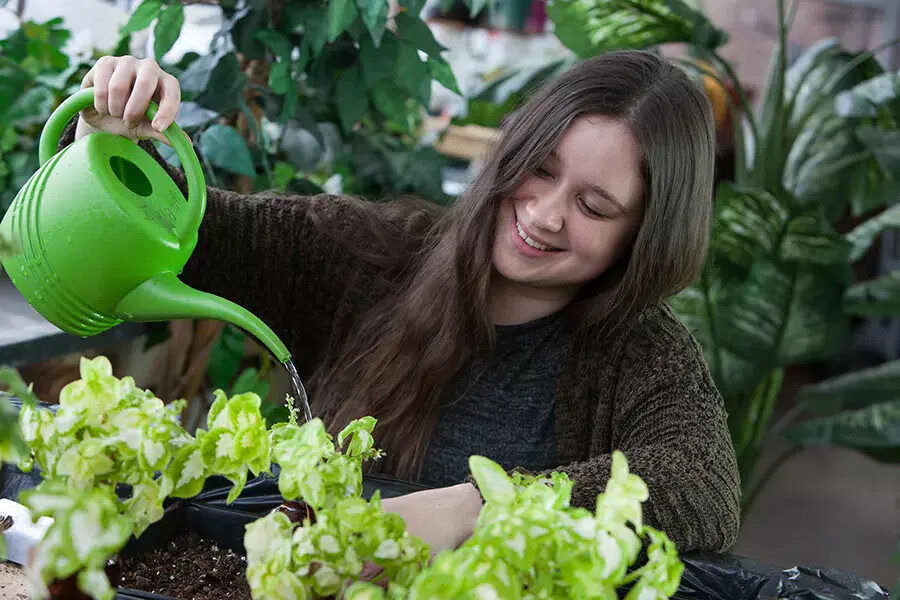Courier News: RVCC receives some national recognition; School called a leader in environmental sustainability

Sue Dorward, Raritan Valley Community College
Published April 19, 2019
Editor’s note: The Branchburg-based Raritan Valley Community College is marking its 50th anniversary this year. An ongoing monthly series of stories will highlight different aspects of the college and its role in the life of the Central Jersey community.
Since becoming the first community college in the country to sign an environmental stewardship agreement with the EPA a decade ago, Raritan Valley Community College (RVCC) has established itself as a national leader in environmental sustainability. In 2016, the U.S. Department of Education named the college a Green Ribbon School for its sustainable education, programs, practices and facilities. RVCC became the first carbon-neutral community college in the country in 2017.
“We are extremely proud of all of RVCC’s accomplishments in environmental sustainability, particularly the College’s efforts to become a carbon neutral institution,” said RVCC President Michael J. McDonough. “By building a cogeneration plant and installing energy-efficient equipment on campus, the College has reduced its greenhouse gas emissions by 50 percent. We are always looking for opportunities to further reduce our emissions.”
The college’s current Strategic Plan formalizes its commitment to sustainability by including environmental stewardship in one of the four key focus areas. This includes pledging to continue reducing the campus’ greenhouse gas emissions, water usage and waste while increasing recycling. To help accomplish these goals, RVCC is expanding its on-campus recycling, which has doubled; is supporting a student-initiated ridesharing pilot program; and, through initiatives spearheaded by the Environmental Club and Human Resources, is distributing reusable bottles and promoting the use of bottle-filling stations on campus. RVCC also has been recognized by the NJ Department of Environmental Protection for its four electric vehicle charging stations, which are open to the public at no cost.
The college partners with several local community organizations on sustainability projects, including an enabling garden. Featuring waist-high planters containing native pollinator plants, the garden includes a walkway and benches to provide an accessible and therapeutic respite. In addition, the Watershed Institute recently awarded RVCC and the NJ Water Supply Authority a grant that funds the planting of native shrubs and trees to restore the bank of the Raritan River tributary that runs through the college’s Branchburg campus. The initiative is designed to improve the river’s water quality downstream. The local community is invited to participate in a number of environmental- related events on campus, including a weekly Science Seminar sponsored by the college’s Science and Engineering Department. The program, which is led by RVCC faculty, students and outside experts in a variety of fields, has focused on such topics as solar power and storage, hydrogen power, electric vehicles, beekeeping and more.
RVCC’s Environmental Sustainability Committee hosts events and conferences, often in late April during Earth Week. Recent conferences, co-sponsored by the NJ Academy of Sciences and the NJ Higher Education Partnership in Sustainability, have focused on forest ecology and sustainable food.
RVCC’s commitment to environmental sustainability is also evidenced in its building design and construction.
The college has adopted Leadership in Energy and Environmental Design (LEED) standards, developed by the US Green Buildings Council, which ensure that buildings are highly energy efficient and environmentally friendly. RVCC has committed that all new buildings follow LEED standards of Silver level or higher. The college’s Ray Bateman Center for Student Life and Leadership qualifies for Gold level, and both the Workforce Training Center (WTC) and the addition to the Christine Todd Whitman Science Center qualify for Silver level. The Bateman Center and the WTC feature rainwater catchment and storage systems that provide water to the buildings’ toilets. The rainwater catchment also irrigates the Bateman Center’s indoor, two-story, living green wall, which hosts mostly tropical plants and provides a relaxing, natural environment for students.
RVCC staff, faculty and students carefully manage the college’s 240-acre campus to maximize native plants, minimize chemicals, and to reduce stormwater runoff. Pollinator-friendly gardens that support Monarch butterfly migrations and native bee populations qualify the campus as a Colossal Monarch Waystation and help secure the Bee Campus USA certification. RVCC is also the first NJ college designated as a River Friendly business. It was recognized for its ongoing efforts to improve the quality of local water resources through water quality management, water conservation, wildlife habitat protection, education and outreach.

